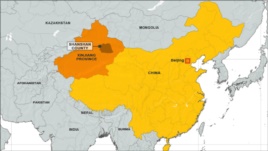Tibetet Segítő Társaság Sambhala Tibet Központ
Tibet Support Association Sambhala Tibet Center
székhely / telephely H-Budapest I. Attila út 123..
(00-36) 70 431 9343 (00-36)70 944 0260 (06-1)782 7721
sambhala@tibet.hu www.tibet.hu tibetpress.info
Facebook/Sambhala Tibet Központ Facebook/Tibett Segítő Társaság
MagnetBank/ 16200010-00110240
IBAN/HU94 16200010 00110240 00000000 SWIFT/HBWEHUHB
(1%) adószám/ 18061347-1-41
nyitva tartás/hétköznap 12.00-20.00 hétvégén előadás függő
» Retro» Tibeti művészet» Interjú» Levelek» Tibet Press» Tibet Press English» Dharma Press» Human Rights» Világ» Kína» Magyar» Ujgur» Belső-Mongólia » KőrösiCsoma» Élettér» Határozatok» Nyilatkozatok» tibeti művészet» lapszemle.hu» thetibetpost.com» eastinfo.hu» rangzen.net» ChoegyalTenzin» tibet.net» phayul.com» DalaiLama.com» vilaghelyzete.blogspot.com» Videók» Linkek» TibetiHírek» Szerkesztőség
Kína elítélt öt embert az áprilisi hszincsiangi összecsapások kapcsán
2013. augusztus 13./VOA/TibetPress
Jelenleg csak angolul olvasható. Magyarul később.
http://www.voanews.com/content/china-sentences-2-to-death-for-xinjiang-violence/1728577.html
William Ide
BEIJING — Chinese authorities in the remote and restive western region of Xinjiang have sentenced two men to death and three others to prison for deadly clashes that authorities are calling a terrorist attack. The violence occurred in late April and left 21 dead.
Chinese state media said that after a one-day trial in the Xinjiang city of Kashgar, Musa Hesen and Rehman Hupur were both sentenced to death for murder and their alleged involvement in a terrorist group. State reports said Hesen was the leader and founder of the group and that he was also involved in the illegal manufacture of explosives.
Sentences for the three other men ranged from nine years to life in prison. The ethnicity of the defendants was not given. But their names suggest they belong to the Turkic-speaking Uighur minority that has long complained of state discrimination in the remote and predominantly Muslim region.
“I don't think these sentences are at all surprising, and I think that these sentences are in line with what we have seen in the past and I think also in line with what we would expect given the coverage and the scale of the incident that they are being condemned for,” said Raffaello Pantucci, a senior research fellow at the Royal United Services Institute.
In total, 19 people were arrested in the wake of the April 23 clash and more trials are expected. The April violence left 15 police and community workers dead. The attack and the funerals that followed received intense media coverage in China.
Authorities tightly control journalists’ access to the region, making it difficult to independently verify accounts of violence in Xinjiang, beyond what is reported by state-backed media.
Family members of the security personnel killed in the April clash told Chinese language media that the men were planning to carry out a major attack the day after the incident occurred.
The government said the violence started when security officials were attacked while investigating suspicious behavior at a home.
Uighurs in XinjiangEhnically Turkic Muslims
Make up about 45 percent of Xinjiang's population
The area was briefly independent in the 1940s before China re-established control in 1949
Many resent Chinese government controls and the increased Han population in Xinjiang
Fear an erosion of their culture and language
Uighur - Han clashes erupted in 2009 in Xinjiang
But some exiled Uighur activists said the violence was caused by the shooting death of a young Uighur boy by armed security personnel. Others have suggested the dispute was long-standing and that it was linked to demands that men shave their beards and women remove their veils.
“This sort of divergent reporting is very much part of the course for the province, we regularly get these sort of divergent reports and it is very difficult to know exactly who is correct. I would say that the one element that is changing about this picture is the government's willingness to put out a relatively complete picture of what they believe or understand the investigation to be,” said Pantucci.
Beijing said it is under threat from organized radical Muslim groups in the area. Xinjiang shares its vast border with Central Asia, Pakistan and Afghanistan and the millions of Uighurs who live there frequently complain about restrictions on religion and culture.
China has spent billions improving living standards for minorities in the region and authorities say they treat minorities there fairly.
Pantucci said authorities in Beijing hope their strategy of focusing on tight security and economic improvement will win over the region’s ethnic minorities and lead to peace and prosperity.
“I think from the government's perspective their policies at the moment are clearly on a trajectory, but I think that they worry that this will take some time to bear fruits and show success. I think their dilemma is how much violence will they be able to take or will go on until these policies start having some sort of success,” Pantucci stated.
In 2009, almost 200 people, mostly Han Chinese, were killed in deadly rioting in Xinjiang's capital, Urumqi.
